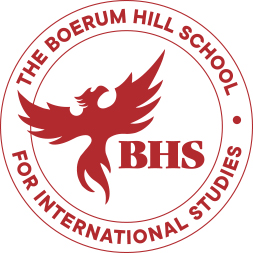The International Baccalaureate Program is a holistic approach to schooling that focuses on global engagement. The program offers participants a framework of mindsets, practices, and standards that drives the development of curriculum, instruction, and culture in every IB school around the world.
The mission statement of the International Baccalaureate Organization is simple. They aim to “develop inquiring, knowledgeable and caring young people who help to create a better and more peaceful world through intercultural understanding and respect.” To this end, classes at BHS are structured to support students as they approach rigorous academic demands through inquiry and collaboration.
Participation in this common framework allows students to earn credits in school that are transferable to other IB schools around the world. Credits earned for coursework, projects and assessments in the Diploma Programme in 11th and 12th grades can also earn students college credits.
QUICK OVERVIEW
Middle Years
Programme
Grades 7-10
Ages 11-16
Diploma
Programme
Grades 11-12
Ages 17-19
What is the Middle Years Program (MYP)?
At a time when students are establishing their identity and building their self-esteem, the MYP can motivate them to achieve success while supporting them in their personal, social, and emotional wellbeing. The programme allows students to build on their personal strengths and to embrace challenges. We do this by creating opportunities for students to develop their potential, to explore their own learning preferences, to take appropriate risks, and to reflect on, and develop, a strong sense of personal identity.”
The framework for the Middle Years Programme, grades 6 to 10, emphasizes global engagement through inquiry, action, reflection, multilingualism and intercultural understanding.
Inquiry
Inquiry is how we learn in the MYP. It is the act of asking questions, seeking information and finding answers to those questions. Students at BHS are asked to grapple with complex, real-world problems. In investigating solutions to these problems, students learn to consider many factors and perspectives when crafting a solution.
Action
Action is what you do with the knowledge you have gained through inquiry. Formative and summative assessments in the MYP are project-based and ask students to apply the findings of their inquiry in the form of a product – a performance, a presentation, a collaborative project, a seminar discussion.
Reflection
Reflection is the process of evaluating what you have learned, and how you performed. It asks that you take stock of old and new knowledge and consider how you might improve your applications in the future. In doing this, MYP faculty and students are constantly considering and reconsidering how to improve.
Multilingualism and intercultural understanding
Multilingualism and intercultural understanding are how students become global citizens. Students learn new languages in the MYP, and they learn about their own place in the world, and how it relates to others.
Culmination of the MYP: Personal Project
Beginning in spring of MYP Year 4 (9th grade) and culminating in late winter of Year 5 (10th grade), students complete an extended Personal Project, in which they set a goal for themselves such as raising awareness of an issue, or expressing a particular message through art, design an innovative product, or engage their community in an event or performance. In order to accomplish their goals, students research their topics extensively, and apply the knowledge gained to create a unique product or outcome.
The Personal Project is evaluated based on students’ skills for investigation, planning, taking action, and reflection, and emphasises self-management.
Diploma Programme (grades 11-12)
The Diploma Programme is offered in grades 11 and 12, and offers pathways for students who wish to be diploma candidates and students who wish to be course candidates.
Diploma Candidates must complete substantial coursework and independent projects beyond their usual classes and assessments. All of this must be completed in order to be considered for an IB Diploma, which universities will often allow to count toward college credit.
Students interested in being course candidates will not need to undertake as much additional work, but they will take IB standardized assessments in the courses they choose. These include a combination of independent work and standardized examination. While they are not eligible for an IB diploma, course candidates are often eligible for some college credit based on the grades they receive.
No student who is on track to graduation is barred from undertaking the full IB Diploma candidacy process; however, students will make these decisions based on conversations with their guidance counselor, teachers, parents, and the DP Coordinator.
Coursework in the Diploma Programme
For Diploma Candidates, there are six two-year courses. Three of them are known as Higher Level (HL) courses, and and three are Standard Level (SL). The DP scores are averaged, so that if a student does well on one subject and poorly on another subject, they are still able to achieve an IB Diploma.
Course candidates can choose which courses they would like to be evaluated in.
The Diploma Programme “Core”
The DP Core consists of additional coursework and projects that students must pass in 11th and 12th grade in order to be considered for an IB Diploma.
Extended Essay (EE)
A 4,000 word independent research paper undertaken with supervision from a faculty advisor.
Creativity, Activity, Service (CAS)
An independent project developed by the student which can be related to coursework butu must also include a service component in which the student volunteers their time without pay.
Theory of Knowledge (TOK)
This is a three-semester course in which students are encouraged to step back from their other courses in order to consider knowledge itself. Students will have to submit two formal assessments for this course — a Theory of Knowledge Exhibition in 11th grade, and a Theory of Knowledge Essay in 12th grade.


